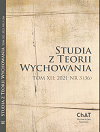Młodzież akademicka. Więzi z państwem i społeczeństwem - międzynarodowe badania porównawcze (Rosja, Gruzja, Turcja, Rumunia i Polska). Narzędzie badawcze, koncepcja pracy zespołowej oraz procedura regionalizacji narzędzia
University students. Ties with the state and the society - international comparative study. Idea, concept, preparation. (Russia, Georgia, Turkey, Romania and Poland). Research tool, the concept of teamwork and the tool regionalization procedure
Author(s): Dagna Dejna, Filip NalaskowskiSubject(s): Social Sciences, Education
Published by: Wydawnictwo Naukowe ChAT
Keywords: testing tool; research process; tool regionalization; teamwork; international comparative study
Summary/Abstract: This article is a continuation of the part I, entitled " University students. Ties with the state and the society - international comparative study. Idea, concept, preparation". We shown the main aspects of our approach. The chosen method, created testing tool, has its own inovative and original nature. There are two reasons for that, firstly, due to the specificity of the area, the object of the research, and secondly, due to the established aims - combining many, so far uncombined, aspects. In addition, we present the concept of the teamwork concept used during the research trip and the original method created to regionalise of the testing tool. It should be noted that, we cooperated with local partners/consultants in order to create the best possible questionnaire - regionalised - adapted to the requirements of culture and history of a given country. Regional coordinators came from both academia and non-academic communities. We write about the necessity of regionalization the testing tool used to measure, identify and diagnose variables in a broader context - in the context of the struggles of other researchers conducting international research. So the article contains numerous references to other international and comparative studies. The presented text also discusses the course of the conducted research followed by the strategy of processing and analysis of data, which were a natural consequence of previously indicated solutions and selected paths. Tekst stanowi kontynuację cyklu publikacji, zatytułowanego Młodzież akademicka. Więzi z państwem i społeczeństwem - międzynarodowe badania porównawcze. Badania prowadzone były podczas wizyt studyjnych na uczelniach wyższych w Rosji, Gruzji, Turcji i Rumunii. W prezentowanym tekście dokonano szczegółowego opisu autorskiego narzędzia badawczego, ponieważ narzędzie to cechowało się pewną innowacyjnością. Po pierwsze, ze względu na specyfikę obszaru, przedmiotu badań, a po drugie, ze względu przyjęte cele – łączenie wielu, do tej pory nie łączonych, aspektów. Ponadto dokonano rekonstrukcji wykorzystanej podczas podróży badawczych koncepcji pracy zespołowej oraz przedstawiono autorski sposób regionalizowania narzędzia badawczego. Zaznaczyć bowiem należy, że, do budowy kwestionariusza ankiety wykorzystywanego poza Polską zostali włączeni lokalni konsultanci- koordynatorzy, w celu regionalizacji narzędzia – dostosowania pytań́ do wymogów kultury i historii danego kraju. Regionalni koordynatorzy pochodzili zarówno ze środowisk akademickich, jak i pozaakademickich. O potrzebie regionalizowania narzędzia badawczego, używanego do pomiaru, identyfikacji i diagnozowania zmiennych, piszemy w szerszym kontekście - w kontekście zmagań innych badaczy prowadzących międzynarodowe badania. W tekście znajdują się więc liczne odwołania do innych badań o charakterze międzynarodowym i porównawczym. W prezentowanym opracowaniu omówiono również przebieg prowadzonych badań i późniejszą strategię opracowywania i analizy materiału, które były naturalną konsekwencją wcześniej wskazanych rozwiązań i obranych ścieżek.
Journal: Studia z Teorii Wychowania
- Issue Year: XII/2021
- Issue No: 3 (36)
- Page Range: 223-240
- Page Count: 18
- Language: Polish

